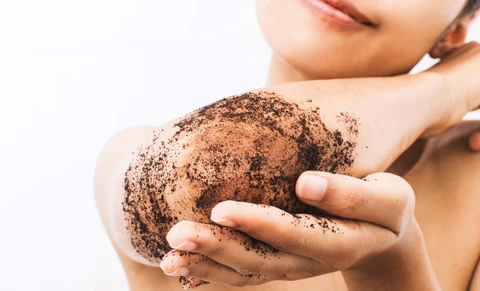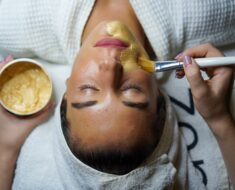Are you a coffee lover or a tea aficionado? Do you know that the benefits of these beverages go beyond their taste and energy-boosting effects? In fact, they can also affect your skin health! But which one is better for your skin: tea or coffee?
Yes, tea is generally considered better for your skin than coffee. Tea, especially green tea, is rich in antioxidants that can protect your skin from damage and aging.
In contrast, coffee can dehydrate the skin and increase inflammation, leading to acne breakouts and other skin issues. So, if you’re looking for a skin-friendly beverage, tea is a better choice than coffee.

But what makes tea more beneficial for your skin? And Is tea better for your skin than coffee?
In this article, we’ll delve into the science behind tea and its effects on the skin, and provide tips on using it for a healthy and glowing complexion.
So, put the kettle on and join us in this tea vs. coffee showdown!
Understanding Tea and Coffee
Tea and coffee both come from plants and contain caffeine, which is a natural stimulant. However, there are a few key differences between the two. Tea comes from the Camellia sinensis plant, while coffee comes from the Coffea plant.
Tea is available in several varieties, such as black, green, white, and herbal, while coffee is available in several roasts and blends. Both tea and coffee contain caffeine, which can have both positive and negative effects on the body.
According to a study cited in the article, daily intake of tea may have a positive impact on skin health.
Individuals who consumed more than one cup of tea per day had a lower risk of developing skin cancer and better skin elasticity compared to those who did not consume tea regularly.
Now we will look into the benefits of both tea and coffee for a better understanding of “Is tea better for your skin than coffee”
5 Proven benefits of tea for the skin
1. Anti-aging properties:
Tea is packed with antioxidants that help protect the skin from free radicals, which can cause premature aging. Antioxidants can also help reduce the appearance of fine lines and wrinkles.
2. Hydration:
Drinking tea can help keep the skin hydrated, which is essential for maintaining healthy-looking skin. Hydration can also help reduce the appearance of fine lines and wrinkles.
3. Reduction of inflammation and redness:
Tea contains anti-inflammatory properties that can help reduce inflammation and redness on the skin. This can be beneficial for those with sensitive or acne-prone skin.

4. Skin detoxification:
Tea can help detoxify the skin by flushing out toxins from the body. This can help improve the overall appearance of the skin.
5. Protection against UV rays:
Green tea, in particular, contains antioxidants that can help protect the skin against harmful UV rays. This can be especially beneficial for those who spend a lot of time in the sun.
5 benefits of coffee for the skin
1. Reducing puffiness:
Coffee contains caffeine, which can help reduce puffiness and dark circles under the eyes. This is because caffeine constricts blood vessels, which can reduce swelling.
2. Anti-inflammatory:
Coffee also contains anti-inflammatory properties, which can help reduce inflammation and redness on the skin. This can be beneficial for those with sensitive or acne-prone skin.
3. Smoothing and brightening the skin:
Coffee grounds can be used as a natural exfoliant, which can help remove dead skin cells and promote cell turnover. This can result in smoother, brighter-looking skin.
4. Improvement of circulation:
Coffee contains antioxidants that can help improve circulation, which can result in healthier-looking skin. Improved circulation can also help reduce the appearance of cellulite.
5. Protection against UV rays:
Similar to tea, coffee also contains antioxidants that can help protect the skin against harmful UV rays. This can be beneficial for those who spend a lot of time in the sun.
Moreover, both tea and coffee have various benefits for the skin, While tea is particularly rich in antioxidants and can provide specific benefits for those with sensitive or acne-prone skin, coffee can reduce puffiness and dark circles under the eyes, exfoliate the skin, improve circulation, and protect against UV rays.
Incorporating both tea and coffee into your skincare routine can provide a range of benefits for your skin health.
Tea vs. coffee: which is better for your skin?
Is tea better for your skin than coffee? To answer this question, we need to consider several key factors, including the levels of caffeine and antioxidants, anti-inflammatory properties, and hydration benefits offered by both beverages.
Caffeine content:
Coffee is typically higher in caffeine than tea, which can provide benefits for the skin such as reducing puffiness and dark circles. However, too much caffeine can also have negative effects on the skin, such as dehydration.
Tea, on the other hand, provides a more moderate amount of caffeine that can still provide benefits without causing negative effects.
Antioxidant content:
Both tea and coffee contain antioxidants that can provide benefits for the skin. Green tea, in particular, is rich in a polyphenol called epigallocatechin gallate (EGCG), which has been shown to have potent antioxidant properties. and can help protect the skin against UV damage.

Coffee also contains antioxidants, such as chlorogenic acid and melanoidins. Chlorogenic acid can help protect the skin from UV damage, while melanoidin’s have been shown to have anti-inflammatory properties.
Hydration:
Both tea and coffee can provide hydration for the skin, which is essential for maintaining healthy-looking skin.
However, some teas, such as herbal teas, may provide more hydration than coffee due to their lack of caffeine and additional nutrients.
Anti-inflammatory properties:
Tea is often rich in anti-inflammatory properties, which can help reduce inflammation and redness on the skin. This can be beneficial for those with sensitive or acne-prone skin.
Coffee also contains some anti-inflammatory properties, but tea may provide more significant benefits in this area.
Overall, both tea and coffee can provide benefits for the skin, but tea may be a better choice for those looking for specific antioxidant benefits and anti-inflammatory properties.
Additionally, tea may be a better choice for those looking for a lower caffeine option or seeking additional hydration.
Why tea is better than coffee?
While both tea and coffee have various benefits for the skin, some people may argue that tea is better than coffee for several reasons.
Firstly, tea is often lower in caffeine than coffee. While caffeine can provide some benefits for the skin, such as reducing puffiness, too much caffeine can dehydrate the skin and cause other negative effects. Tea provides a more moderate amount of caffeine, which can still provide benefits without causing negative effects.
Secondly, tea is often rich in specific antioxidants that provide benefits for the skin. For example, green tea contains high levels of a polyphenol called EGCG, which has been shown to have potent antioxidant properties and can help protect the skin against UV damage.
Research has shown that tea may indeed be better for the skin than coffee.
A study published in the Journal of Nutrition found that green tea consumption can improve skin health. The study involved women who consumed green tea powder daily for 12 weeks. The researchers found that the women experienced increased skin elasticity and decreased roughness and scaling

Another study published in the Journal of Investigative Dermatology found that the polyphenols in green tea can help protect the skin against UV-induced damage.
Lastly, tea is often more versatile than coffee in terms of flavors and types. There are many different types of tea, including herbal teas, that can provide various benefits for the skin and overall health.
Additionally, tea can be enjoyed both hot and cold, making it a refreshing and hydrating beverage for any time of day.
Overall, while both tea and coffee have benefits for the skin, tea may be a better choice for those looking for a lower caffeine option, specific antioxidant benefits, and a wider range of flavors and types.
If you’re interested in learning more about the differences between green tea and coffee, be sure to check out our guide on “Green Tea vs Coffee“
Frequently Asked Questions
Does tea make your skin better?
Tea can provide several benefits for skin health, including hydration, antioxidants, and anti-inflammatory properties. Specific types of tea, such as green tea, have been shown to have potent antioxidant effects that can help protect the skin against UV damage.
Additionally, tea can be a lower caffeine alternative to coffee, which can have negative effects on the skin in excess.
Is tea or coffee good for skin whitening?
Neither tea nor coffee can directly lighten the skin. However, some types of tea, such as green tea, contain antioxidants that can help protect the skin against UV damage and prevent dark spots and hyperpigmentation.
Additionally, drinking tea or coffee can help improve overall skin health, which can lead to a more radiant and healthy-looking complexion.
Which is healthier tea or coffee?
Both tea and coffee can provide health benefits when consumed in moderation. Tea is often a lower caffeine option and can provide specific antioxidant benefits for the skin and overall health.
Coffee can provide some benefits, such as increased alertness and improved cognitive function, but excessive consumption can have negative effects on the body.
Is tea or coffee good for acne?
There is limited research on the effects of tea and coffee on acne specifically. However, both beverages contain caffeine, which can have a stimulating effect on the body and potentially exacerbate acne.
Additionally, adding sugar or dairy to coffee or tea can contribute to acne breakouts. Overall, it is best to consume both beverages in moderation and focus on a healthy, balanced diet and skincare routine to improve acne.
Conclusion
In conclusion, both tea and coffee have potential benefits for skin health. While coffee can have antioxidant and anti-inflammatory effects on the skin, too much caffeine can have negative effects, such as dehydrating the skin.
On the other hand, tea provides a moderate amount of caffeine and is often rich in specific antioxidants that can provide benefits for the skin.
Additionally, some studies suggest that regular tea consumption may reduce the risk of skin cancer and improve skin elasticity.
Overall, incorporating both tea and coffee in moderation as part of a healthy diet and lifestyle may have positive effects on skin health.






